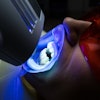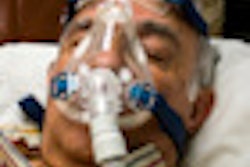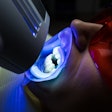Middle-aged and older men who have obstructive sleep apnea (OSA) have higher risk of stroke and death, even if their cases are mild, according to a study being presented this week at the Experimental Biology 2012 meeting in San Diego.
Researchers at Baylor College of Medicine developed a model that recreates human OSA to better understand its effect on cerebral vessels. They found that as few as 30 days of OSA exposure changed cerebral vessel function, which could ultimately result in a stroke.
The new model improves upon current animal models, which gauge responses to decreased blood oxygen levels. Inducing true apnea in the new model yields better data, according to the researchers. To accomplish this, 30 apneas of 10 seconds were induced in sleeping animals during eight-hour periods for up to one month.
One month of apnea reduced cerebral vessel dilatory function by 22% in the test subjects, the researchers noted, which could increase the likelihood of a stroke.



















